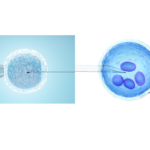After IVF Treatment: How Many Days of Bedrest Is Actually Needed?
Undergoing IVF (In-Vitro Fertilization) is a big step toward parenthood for couples who face fertility challenges. While the medical process is carefully monitored, one area that often causes confusion and concern is post-IVF care — particularly the need for rest. Many couples ask: “After IVF treatment how many days of bedrest are needed?” or “Is bed rest required in the first trimester after IVF?”
With evolving research and clinical best practices, it’s important to separate myths from facts so patients can approach the post-IVF phase with confidence and clarity.
Understanding the IVF Process

Before we dive into post-treatment care, let’s briefly understand what IVF entails. The process includes:
1. Ovarian stimulation using fertility medications.
2. Egg retrieval.
3. Fertilization of eggs with sperm in a lab.
4. Embryo transfer into the uterus.
It is the embryo transfer — the final and most delicate step — that often prompts concerns about bedrest. After this phase, many women wonder what lifestyle changes are necessary to improve the chances of successful implantation.
After IVF Treatment: How Many Days of Bedrest Are Recommended?
This is one of the most frequently asked questions in fertility clinics.
In the past, women were often advised to stay in bed for several days after the embryo transfer. However, modern research has shown that extended bedrest is not only unnecessary but may even have a negative impact on IVF outcomes.
What the Experts Recommend:
Immediate Post-Transfer Rest: A short rest period of 20–30 minutes in the clinic is typically recommended after the embryo transfer.
First 24 Hours: Light activity and rest at home are fine. Avoid any strenuous movement, but there’s no need to lie flat in bed all day.
Day 2 and Beyond: You can resume normal activities such as walking, light cooking, desk work, etc., while avoiding heavy lifting, intense workouts, or stressful environments.
So, after IVF how many days of bedrest do you really need? The current answer, supported by science and top fertility experts, is: just the day of the embryo transfer, followed by gentle activities in the days after.
Is Bed Rest Required in the First Trimester After IVF?
Another common concern couples have is whether bedrest should be continued into the first trimester after IVF conception.
The Reality:
Just like after the embryo transfer, routine bedrest during the first trimester is generally not recommended unless prescribed for specific medical reasons. These might include:
Severe cramping or bleeding
Risk of miscarriage or history of pregnancy loss
Diagnosis of a subchorionic hematoma or other complications
For most IVF pregnancies, the recommendation is to maintain a normal lifestyle with reduced stress, adequate sleep, and avoidance of physically demanding activities. Staying active (light walking, stretching) and emotionally healthy is actually more beneficial than staying confined to bed.
Why Prolonged Bedrest May Not Help
Contrary to common belief, extended bedrest does not improve embryo implantation. In fact, it may increase:
Stress and anxiety levels
Risk of blood clots
Muscle stiffness or fatigue
Hormonal imbalance due to inactivity
Studies published in leading fertility journals suggest that women who return to their regular daily routines (with modifications) actually experience higher implantation and pregnancy success rates.
Dos and Don’ts After IVF Transfer
Here’s a quick reference list to help you navigate the crucial days after embryo transfer:
✅ Dos:
- Light walking and slow-paced movements
- Eating balanced, nutrient-rich meals
- Staying hydrated
- Gentle meditation or reading
- Following medication schedules strictly
❌ Don’ts:
- Strenuous exercise or lifting heavy objects
- Hot baths or saunas
- Smoking, alcohol, or caffeine
- Stressful environments or emotional turmoil
The Importance of Emotional Well-being
IVF is a physically and emotionally intense process. While physical rest is important, emotional rest is equally crucial. Anxiety about whether implantation will succeed, constantly checking symptoms, or isolating oneself can negatively impact hormonal balance and overall health.
Stay connected with your partner, lean on your support system, and engage in activities that calm your mind.
Your IVF Journey Deserves the Best Care: Choose Iris IVF Mumbai Centre
At Iris IVF Centre, we understand that every patient’s IVF journey is unique — and so is the post-treatment care they require. Our experienced fertility team offers compassionate, evidence-based advice so you can feel confident every step of the way.
Whether you’re preparing for your first embryo transfer or need expert support in early pregnancy, Iris IVF Mumbai provides personalized care that goes beyond clinical treatment. We help you understand exactly after IVF treatment how many days of bedrest are needed, and guide you through each phase with clarity and reassurance.
Explore our comprehensive IVF programs at Iris IVF Mumbai Centre, or take the first step toward your dream of parenthood with our trusted IVF Treatment in Mumbai service.
Conclusion
In conclusion, if you’re wondering after IVF treatment how many days of bedrest are really necessary, the answer is reassuring: only the day of the embryo transfer, followed by light activity and a low-stress lifestyle. There is no scientific basis for prolonged bedrest unless specifically advised by your fertility specialist.
Instead of staying in bed for days, focus on creating a balanced, calm, and emotionally supportive environment. And most importantly, trust a fertility team that understands your journey.
Let Iris IVF Mumbai Centre be your partner in this life-changing path toward parenthood.
Dreaming of a Family?
Iris IVF Centre is Your Partner in Parenthood! Contact us today for a personalized consultation and begin your IVF journey!
FAQ'S
Q1: After IVF treatment how many days of bedrest are required?
A: Only the day of embryo transfer typically requires light rest. Most fertility experts advise returning to normal, non-strenuous activities within 24 hours. Extended bedrest is not necessary.
Q2: Is complete bed rest necessary after embryo transfer?
A: No. Research has shown that complete or prolonged bedrest after embryo transfer does not improve implantation or pregnancy rates. Light movement and a calm routine are more beneficial.
Q3: Can I go to work the day after my IVF embryo transfer?
A: Yes, you can return to work as long as your job is not physically demanding. Many women continue light desk work the day after transfer. Listen to your body and avoid stress.
Q4: Is bed rest required in the first trimester after IVF?
A: Routine bedrest is not recommended in the first trimester unless there are specific medical concerns. Normal, low-impact activity is considered safe for most IVF pregnancies.
Q5: What activities should I avoid after IVF embryo transfer?
A: Avoid heavy lifting, vigorous exercise, alcohol, caffeine, and high-stress situations. Also, skip hot tubs, saunas, and long baths during the early post-transfer days.
Q6: Does lying down after embryo transfer help implantation?
A: A short rest period of about 20–30 minutes post-transfer is common, but lying down for extended periods has not been shown to improve success rates.


